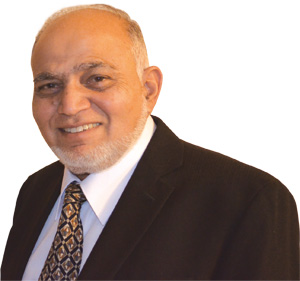Community Spotlight: Dr. Iqbal Nazir, Homeopathic Consultant and Therapist

This month, Desh-Videsh talked with one of our own, Dr. Iqbal Nazir, a practicing homeopath. Learn more about his background and passion for his work.
Please tell us a bit about your background.
I was born in Moradabad, Uttar Pradesh, and received my primary education from Baqar High School in Rampur. I earned a Bachelor’s in Physiology and Master’s in Biochemistry as well as degrees in Pharmacy and Pharmacognosy (study of medicinal plants and Homeopathy). I am also a Certified Clinical Chemist from the American Society of Clinical Pathology.
I am married and have two boys and two girls, and my wife is a Nutritionist who cooks very healthy, organic foods!
Tell us a little bit about your career and how you came to be where you are today.
Early on in high school, I had a strong medical aptitude and the full support of my father. His dream was that I acquire the highest level of education in the medical field to serve the family and community, and his constant encouragement led me to higher education.
I moved to New York City and start working in a local pharmacy. After some time, I got a job with Columbia Presbyterian Hospital’s Clinical Laboratory as a Medical Technologist, and I learned about the laboratory tests required to diagnose various diseases. I also worked at NYU Hospital, before moving to Florida where I worked as a Supervisor of the Clinical Chemistry Lab at Jackson Memorial Hospital in Miami.
My direct contact with patients both in the pharmaceutical and clinical settings led me to understand various diseases and symptoms as well as the cure and side effects of medicines. When I studied details about prescription drugs, it was mind boggling to know these synthetic toxic chemicals caused more harm than good with enormous side-effects. Patients were not getting well, and if one symptom was cured, two more appeared. People live all their lives taking medications for many chronic diseases such as diabetes, cholesterol, ulcers, arthritis, depression, and more. The use of steroids, antibiotics, pain killers, and antidepressants deteriorates ones immune system to the point that a patient is always sick and reliant on numerous medications. These were the circumstances which lead me to practice homeopathy, where natural medicine derived from medicinal plant sources and has no side effects as they cure the root cause of the problems.
What exactly is homeopathic medicine and how does it differ from conventional medicine?
German doctor Samuel Hahnemann discovered Homeopathy in 1799. Homeopathy is a science and a form of alternate medicine, which involves treating the individual with highly diluted substances that are non-toxic with the aim of triggering the body’s natural system of healing. The basic principle of Homeopathy is the “Law of Similar” meaning that “Let like be cured by like.”
For example, if a patient complains about insomnia, a Homeopath will look for the remedy, which causes the same symptoms in healthy person. Caffeine in large doses causes insomnia, but in extremely small doses will put the person to sleep thereby treating sleeplessness. Onions being peeled by a healthy person can cause itchy and watery eyes. For a patient complaining of itching and watery eyes, a Homeopath would prescribe Alum Sepia (the chemical name of red onion) to cure watery eyes. The majority of Homeopathic medicines are taken sublingual and absorb directly into the blood through the mucus membranes in the mouth; therefore, they do not have preservatives, fillers, binders, dyes and other toxic chemicals like conventional medicines.
Though Homeopathy has been practiced in the US since 1821, tis popularity began to fade in the early 1900s due to the growing influence of big pharmaceutical companies. The practice of homeopathy faded away, and now only Connecticut, Arizona, and Nevada recognize the field and have Licensed Homeopath Doctors. Florida authorizes Homeopathy as an Alternate Medicine. Homeopathy is practiced around the world mainly in Germany, France, United Kingdom, Sweden, Australia, India, Pakistan, Bangladesh, and some South American nations.
In conventional medicine, doctors suppress the symptoms of diseases with an emphasis on controlling the disease (i.e. keeping diabetes, cholesterol, or arthritis under control) instead of seeking to cure. If a patient goes to his primary care physician with complaints of uncontrollable headaches, ulcers, arthritis, shortness of breath, severe back pain, etc., the primary care doctor will refer him/her to a specialist such as a neurologist, rheumatologist, orthopedic, urologist, or nephrologist. The specialist will prescribe medications most f which cause side effects making the condition of patient worse. Now this patient has even more problems. In contrast, a Homeopath does not cure diseases it cures the person with the disease. People should consider Homeopathy for acute and chronic conditions because of the effectiveness in diagnosing the root cause of problems. As Homeopathy cures rather than controls.
What are the top three habits everyone should enforce to ensure a healthy lifestyle – or at least put them on the path to healthy, holistic living?
To live a healthy lives three things are important: food, exercise, and spirituality.
Food : Eat organic and natural foods, avoid processed, junk foods, and read labels. Do not buy foods with nitrates, sulfates, red or yellow dye, high fructose corn syrup, MSG, modified starch, or benzoates. Do not drink sodas as they contain sodium benzoate, which depletes calcium from bones. Do not drink alcohol – it is a drug, removes water from tissues, and is a powerful dehydrating agent. Do not smoke as any kind of smoking is injurious to health.
Exercise : At least walk 500 steps per day, do some cardiovascular exercises.
Spiritual : Learn to forget and forgive people, and see your own shortcomings. If you start looking for a perfect person, you will be left alone. Get involved in yoga, prayers, and meditation.































